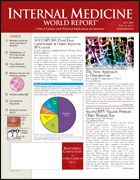Publication
Article
Internal Medicine World Report
Rigorous Exercise and Dieting May Induce Bone Loss
Author(s):
A Fine Line between Fitness and Skeletal Problems
By John Schieszer
Anne Loucks, PhD
TORONTO, Canada—Women who follow strict exercise and diet regimens may harm their body's ability to form new bone, placing them at risk for osteoporosis later in life, a study presented at the Endocrine Society's annual meeting has found.
In addition, adolescents and young women who under-eat and rigorously exercise during the prime bone-building years may be doing more harm to their overall bone health than previously recognized. Until about age 30, both men and women form enough new bone to replace the bone that breaks down naturally.
However, severe under-nutrition causes a drop in estrogen levels that speeds up bone breakdown. Young women who severely restrict their diet or do not increase their energy intake sufficiently when they exercise often stop menstruating and develop low bone density, with resulting fractures.
Data from this new study show that the formation of new bone also depends on energy availability, the difference between calories eaten and calories burned during physical activity. This held true for adolescents and for adults in their late 20s/early 30s.
"Thousands of women severely restrict their diet and practice rigorous exercise programs for fitness and weight control," said lead investigator Anne Loucks, PhD, professor of biological sciences at Ohio University, Athens, Ohio. "Because some don't see obvious signs of under-nutrition, such as a disrupted menstrual cycle, they may think they're eating enough. If their diet does not supply enough energy to fuel their exercise level, though, they may be harming themselves. They need to replenish those calories."
When growing adolescents stop menstruating as a result of anorexia or inadequate energy intake for level of physical activity, physicians often recognize this as a warning sign for bone loss. This new study, however, which included adults whose reproductive systems are less sensitive to low energy availability, showed that menstruation in adult women is not a reliable indicator of sufficient energy availability for skeletal health.
In 2 groups of healthy women, energy availability was deprived by restricting their caloric intake for 5 days (women aged 18-23) and having them exercise for about 100 minutes each day (women aged 26-32). All the women had normal body fat and menstruated regularly.
N
N
Blood levels of 2 markers for bone formation—osteocalcin and procollagen type 1 -terminal propeptide—were measured. Low energy availability was found to suppress osteocalcin levels by 36% and procollagen type 1 -terminal levels by 22% in both age-groups.
IMWR
"These findings are clinically significant," Dr Loucks told . "Many healthy women who are trying to lose weight may have detrimental effects on bone formation. This is one of the first studies to establish this."
This study should serve as a wake-up call for adolescents and young women who under-eat and rigorously exercise during their prime bone-building years. "We no longer can think of osteoporosis as merely a geriatric disease. It may actually be a pediatric disease," said Dr Loucks. "We fear that many women at a very early age may be failing to achieve their genetic potential for peak bone density."
At a time when all physicians are well aware of the problems associated with obesity, this new study points to the need to also keep an eye on those who are under-eating and over-exercising, which could lead to bone loss.





